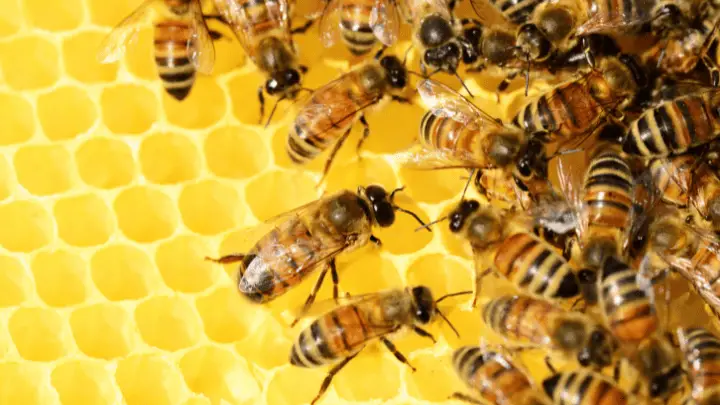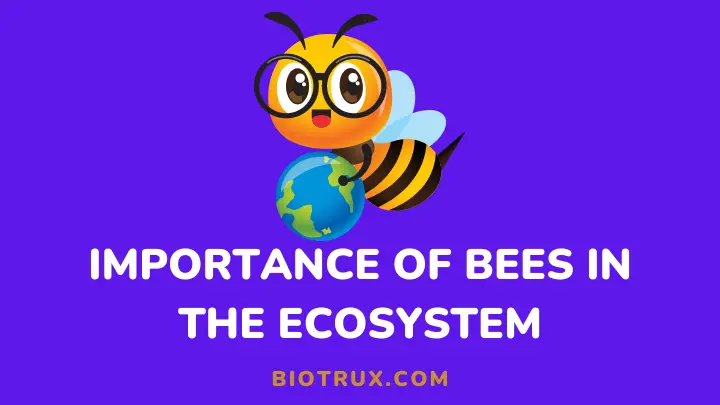Bees may seem like just another insect buzzing around in the garden, but these tiny creatures have so much importance in the ecosystem. Often overlooked and underappreciated, bees are essential to pollinating plants that produce our food.
The United Nations even declared May 20th as World Bee Day to raise awareness about the importance of these fuzzy little insects. Bees are vital to our food supply and play a critical role in maintaining biodiversity and keeping our environment healthy.
So, let’s look closer at the importance of bees in the ecosystem and what we can do to protect them.
1. Pollination
Bees are well-known for their ability to pollinate flowers, hence their importance in plant reproduction and ecosystem balance. Pollination occurs when bees transfer pollen from the male part of a flower (the stamen) to the female part (the pistil), allowing the plant to create seeds and fruit.
Without this process, many plants would not be able to reproduce, which could ultimately lead to their extinction. Bees are estimated to pollute one-third of our food, including fruits, vegetables, and nuts.
Without these pollinators, the global food supply would be severely impacted, causing ripple effects throughout the ecosystem. Bees are crucial in maintaining the delicate balance of our planet’s ecosystems, making protecting them all the more important.
2. Biodiversity Conservation
Bees play an important role in biodiversity conservation. Biodiversity refers to the variety of living things on the planet, from tiny microbes to towering trees. Bees are crucial in this web of life as they help pollinate plants, allowing them to reproduce and thrive.
Pollination is essential for plant diversity, as different plants require different types of pollination to reproduce successfully. Without bees, many plants would be unable to reproduce, which could ultimately lead to a loss of plant species.
This, in turn, would have a knock-on effect on other living things, including animals that depend on these plants for food and shelter. Many studies have shown that a decline in bee populations could have serious consequences for food security and the overall health of ecosystems.
3. Honey Production and Other Medicinal Uses
Bees have so much importance in the ecosystem; one of their most significant contributions is honey production. Honey is not only a natural sweetener, but it also has several medicinal uses.
Honey has antibacterial properties, making it an excellent natural remedy for sore throats, coughs, and wounds.
It is also a natural anti-inflammatory, making it an effective treatment for allergies and other respiratory problems. Moreover, it can help boost the immune system and has been known to aid digestion.
In addition to honey, bees produce other useful products like beeswax, propolis, and royal jelly. Beeswax has several uses, including making candles, soaps, and cosmetics. Propolis, a sticky substance that bees collect from trees and plants, produces medicines, toothpaste, and chewing gum.
Royal jelly, secreted by bees and fed to the queen bee. It is also used for its medicinal properties, improving skin health and enhancing brain function.
4. Environmental Indicators
Bees are essential components of ecosystems and play a vital role in maintaining the environment’s delicate balance. As environmental indicators, bees can provide crucial information about the health of ecosystems and the quality of the environment.
Bees are known to be sensitive to environmental changes, particularly in temperature, precipitation, and air quality. They can also detect changes in the availability and quality of food sources, such as flowers, nectar, and pollen.
By monitoring bee populations and behavior, scientists can gain valuable insights into the state of the environment and the impact of human activities on ecosystems.
For example, declines in bee populations may indicate environmental problems such as pollution and habitat loss. Conversely, healthy and diverse bee populations can signify a healthy and thriving ecosystem.
5. Wildlife habitat
Bees are not just vital for pollination; they also play an important role in creating wildlife habitats. By pollinating plants, bees form vegetation that serves as food and shelter for other wildlife species.
The habitat created by the bees can support various organisms such as birds, insects, and mammals, all of which rely on plants to survive. The honeybee, in particular, is a critical part of the ecosystem due to its role in pollinating wildflowers and crops.
Their work sustains these plants and benefits the surrounding wildlife by creating habitats that attract diverse animals and insects. Many plant species could disappear without bees, disrupting entire food chains and ecosystems.
This would also lead to a decrease in the food supply for animals that depend on these plants, eventually affecting the survival of entire species.
6. Ecosystem Resilience
Bees also contribute to ecosystem resilience, which refers to the ability of an ecosystem to resist and recover from disturbance. Bees are key players in maintaining the diversity and abundance of plants in an ecosystem, providing habitat and food for various animals.
The pollination of plants also contributes to soil fertility and nutrient cycling, helping to maintain a healthy balance within the ecosystem. Furthermore, bees are a crucial part of the food chain, providing food for predators such as birds and insects.
Overall, the role of bees in maintaining ecosystem resilience cannot be overstated. Their contribution to the health and stability of ecosystems highlights the importance of preserving their populations and protecting their habitats.
By taking steps to support bee populations, we can help to ensure the resilience of our ecosystems and the sustainability of our planet.
7. Economic Value
Bees play a significant role in our economy as they are responsible for pollinating crops that produce food for humans. These crops include fruits, vegetables, and nuts such as apples, almonds, blueberries, and avocados, which are all crucial for the agriculture industry.
Without bees, we would lose a vast portion of our food supply, leading to food shortages and price hikes. Bees also produce honey, a valuable commodity with many uses in the food industry.
Honey is a natural sweetener used in baked goods and has antibacterial properties, making it an excellent alternative to artificial sweeteners. The production and sale of honey also provide jobs for beekeepers and support the local economy.
Overall, the economic value of bees is crucial for our food security and livelihoods. We must continue to protect and conserve these essential pollinators and their habitats to ensure a sustainable future.

FAQs
What would happen if bees disappeared?
The absence of bees would result in reduced crop yields, leading to potential food shortages and a decline in biodiversity. Many crops, including fruits, vegetables, and nuts, rely on bee pollination.
What can be done to protect bees from decline?
To protect bees from decline, preserving and restoring their habitats is essential. This includes conserving natural areas, planting native wildflowers, reducing pesticide use, and promoting sustainable agricultural practices prioritizing pollinator health.
Why are bees considered important for the ecosystem?
Bees are considered important for the ecosystem because they are crucial pollinators. They help plants reproduce by transferring pollen from the male part of a flower to the female part. Thus, ensuring the production of fruits, vegetables, and seeds.
Final Thoughts
In conclusion, bees are more than just insect pollinators. They are crucial in maintaining a healthy ecosystem, sustaining biodiversity, and providing the food we need to survive.
Bees are vital in pollination, which is crucial for global food security. Therefore, caring for these tiny creatures is important to protecting their habitats, reducing harmful pesticides, and promoting conservation efforts.
We can help ensure these essential pollinators’ future and our planet’s well-being by working together. So let’s do our part and appreciate the small but mighty bees that improve our world.
You can also learn about animals that don’t sleep or sleep a little.
Thanks for reading.

